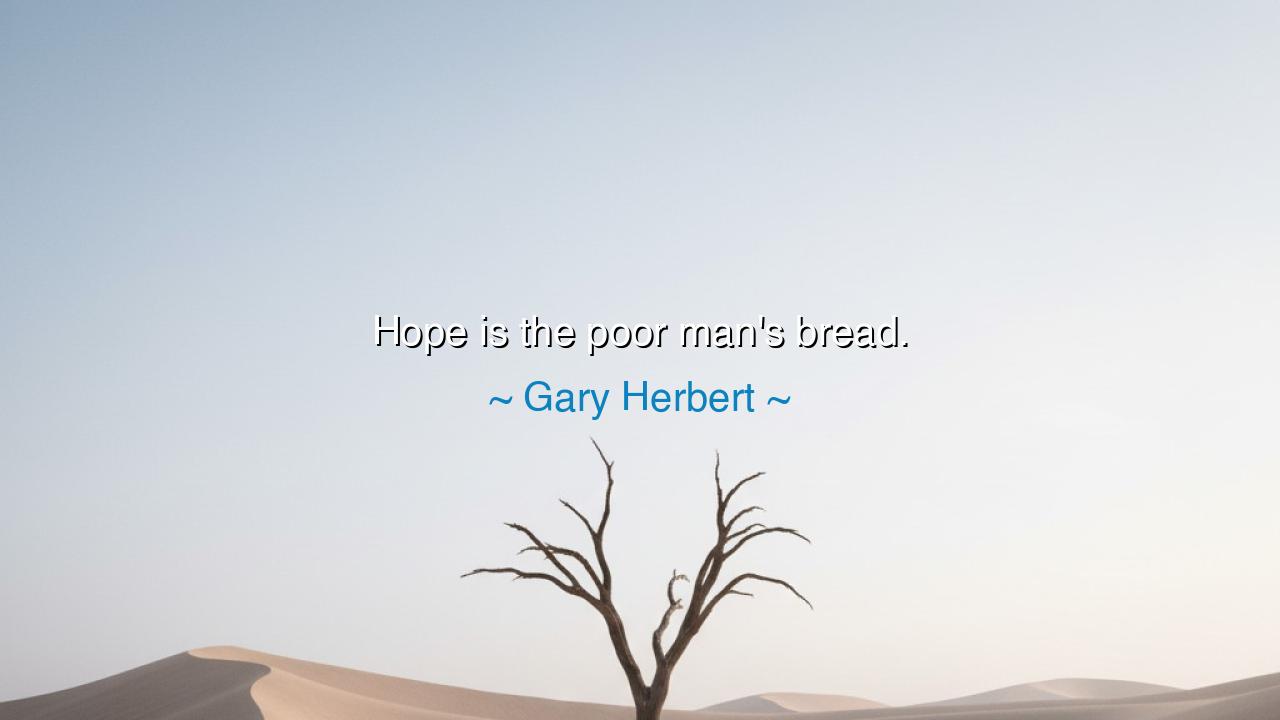
Hope is the poor man's bread.






The words of Gary Herbert, “Hope is the poor man’s bread,” speak with the solemn power of eternal truth — a truth that transcends wealth, time, and place. They carry the quiet dignity of those who have little, yet still rise each morning with courage. Bread, the simplest of foods, has always been the symbol of sustenance — that which keeps the body alive. But hope is the sustenance of the soul. For the poor, who may lack gold, comfort, or certainty, it is hope that fills the emptiness and keeps them moving through hardship. It is the unseen nourishment that allows a person to endure when all else is lost.
To the ancients, this saying would have been received as a sacred truth, for they too knew that man does not live by bread alone. The body may hunger, but it is the spirit’s hunger for meaning that truly tests the strength of humanity. The farmer who sows seed despite drought, the mother who sings to her child in famine, the prisoner who dreams of freedom — all are fed by the same invisible food. Hope is the poor man’s bread because it keeps alive the belief that tomorrow can still bring light, even when today is dark. It fills the heart when the hands are empty.
Throughout history, the poor and the oppressed have survived not by riches, but by the power of hope. Consider Viktor Frankl, the psychologist who endured the horrors of a Nazi concentration camp. He wrote that those who lost hope perished quickly, but those who still believed — who held even a flicker of purpose — endured the unendurable. Their bodies were starved, yet their souls were fed by the idea that life, even in suffering, still held meaning. Hope became their bread, and though their bodies were frail, their spirits were unbroken. Frankl’s life reminds us that hope is not weakness; it is strength disguised as endurance.
Even in scripture, the same truth resounds. When the Israelites wandered through the desert, they were fed by manna from heaven — food that sustained them for the journey. But even before the manna fell, they were sustained by hope: the promise of a land of freedom, a future beyond slavery. This unseen faith kept them walking when hunger gnawed and fear pressed close. So too, in every generation, those who have little in the world’s eyes survive on the sacred bread of hope — the conviction that their suffering is not meaningless, that redemption waits just beyond the horizon.
Yet Herbert’s words carry not only empathy but challenge. He speaks as one who understands that hope must not be treated as an excuse for neglect. If the poor man’s bread is hope, then those who have plenty must not let him starve on hope alone. For hope should lead to action, to compassion, to the building of a world where every man may have both bread for his body and hope for his soul. It is a call to all who have been blessed — to remember that while hope sustains the poor, justice nourishes them more deeply.
Still, there is majesty in Herbert’s recognition of the poor man’s dignity. For though wealth may buy bread, it cannot buy the resilience that comes from hope. The poor, though denied comfort, often possess a richness of spirit unknown to kings — the unyielding belief that life can yet bloom in barren soil. Hope becomes their song, their fire, their shield against despair. It is the last possession that no tyrant can steal, no famine can consume, and no death can extinguish.
So, my listener, let this truth settle within you like warm bread in the heart: never despise the power of hope, whether in yourself or in others. When life grows cold, feed your spirit with the remembrance that dawn follows even the longest night. When you see another struggling, offer them not pity, but encouragement — a word, a gesture, a kindness that restores their faith. For hope, when shared, multiplies. It is the one bread that grows by being broken.
And thus, the teaching endures: Hope is the poor man’s bread — but it is also the wise man’s feast. Those who learn to live upon hope discover a strength that no hunger can conquer. So let your heart be a table where hope is always served — for yourself, for your loved ones, and for the weary traveler who has forgotten the taste of light.






AAdministratorAdministrator
Welcome, honored guests. Please leave a comment, we will respond soon